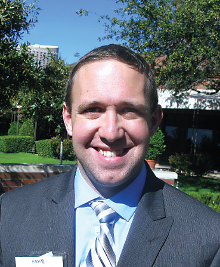Brian Hurley, M.D., an addiction psychiatrist and newest member of AMA Section Council on Psychiatry, is one example of how the 167-year-old physician group is no longer “your father’s AMA.”
A delegate to the section council from the Gay and Lesbian Medical Association (GLMA), Hurley’s presence is evidence of the widening diversity of the organization and its growing attractiveness to a younger generation of physicians.
“I have always felt very welcome here at the AMA,” Hurley told Psychiatric News. “There is a network of people who have a progressive vision for American medicine with whom I have a found a home at the AMA. I believe the AMA has made great strides in incorporating diverse voices, though there is still progress to be made. I see lots of potential for the AMA becoming even stronger through enriching our diversity.”
When asked what he hopes to bring to the section council, Hurley pointed to a sharing of interest and concerns between APA and the GLMA. “At the very least, I bring a vote and energy,” he said. “More broadly, the GLMA has decades of experience working at combatting stigma—just as the Section Council on Psychiatry works to combat stigma against our profession and our patients. So I think there is a clear resonance.”
This year, Hurley became the 11th voting delegate in the section council, which includes seven delegates from APA; one delegate each from the American Academy of Child and Adolescent Psychiatry, American Academy of Psychiatry and the Law, and the GLMA; and one sectional delegate from the Resident and Fellow Section. Next June, the American Association of Geriatric Psychiatry will add a delegate, bringing the voting membership to 12.
That growing strength translates into influence in the House of Delegates. And Hurley is already having an impact. At the June 2015 Annual Meeting of the House of Delegates, Hurley said that the GLMA will be sponsoring a resolution to end the exclusion of transgender individuals from service in the military.
“The Department of Defense prohibits transgender people from enlisting and also has policies that prohibit someone who is transitioning while enlisted from receiving any kind of gender-related treatment,” he said. “There are treatments for gender dysphoria that TriCare doesn’t cover.”
He noted as well that the GLMA has joined the AMA in calling for an end to the lifetime deferral on blood donation by men who have had sex with men. “There is no real scientific rationale for that policy, so we support the call for the FDA and HHS to review this policy.”
Also of note, for the past three years, Hurley has been one of nine members of the Association of American Medical Colleges (AAMC) Advisory Committee on Sexual Orientation, Gender Identity, and Sex Development. That committee has developed competencies, a resource guide, and a video series designed to help educators implement curricular changes in medical schools and to ultimately improve the health care of individuals with diverse sexual orientations, gender identities, and sex anatomies. The guide, including the competencies, was published on the AAMC website and released at the 2014 AAMC annual meeting and is available as a free pdf download
here.
The GLMA had its origins as the Bay Area Physicians for Human Rights in the 1980s, later as the American Physicians for Human Rights. “We have over 30 years of experience advancing LGBT equality,” Hurley said. “Our mission is to support health professionals in all aspects of promoting LGBT health care and to see that all physicians are equipped to treat patients of every sexual orientation and gender identity with competence and respect.”
Professionally, Hurley is working on a research fellowship at the University of California, Los Angeles, and next year will begin a Robert Wood Johnson Clinical Scholars fellowship. He has a private practice and also works in emergency psychiatry at a community hospital in Los Angeles.
Hurley encourages APA members to pay attention to the AMA. “I think APA members would be well served to recognize how important APA’s voice is at the AMA in advancing the interests of psychiatry and our patients and making sure that American medicine is inclusive of our issues,” he said. “I hope APA members will also be aware that there is a Gay and Lesbian Medical Association in addition to the Association of Gay and Lesbian Psychiatrists, and that we are the voice for health professionals advancing LGBT health.” ■

